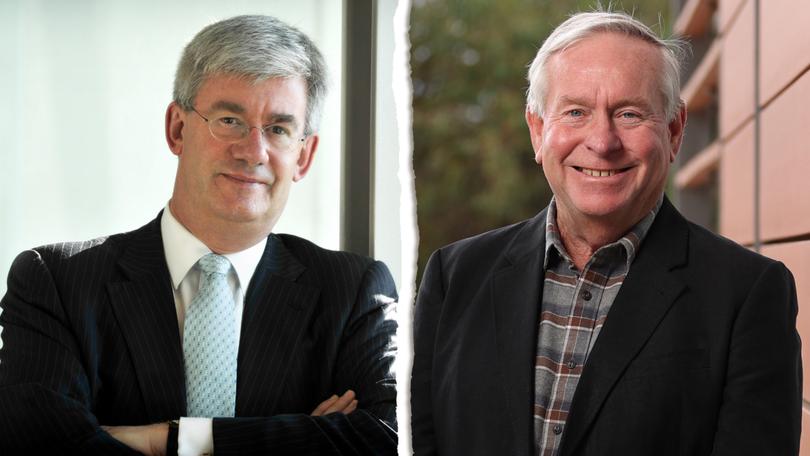GST debate: Economist Saul Eslake goes head-to-head with ex-WA premier Colin Barnett

Economist Saul Eslake has reignited his attacks on the Federal Government’s assurances about WA’s GST share, labelling the deal the worst public policy decision of the century.
Mr Eslake laid out his argument in a debate at the National Press Club on Wednesday before former WA premier Colin Barnett made a case for overhauling a system he described as not “fit for purpose”.
Mr Barnett argued that 90 per cent of the overall GST pie — expected to grow to almost $90 billion next financial year — should be distributed to States according to population size.
Sign up to The Nightly's newsletters.
Get the first look at the digital newspaper, curated daily stories and breaking headlines delivered to your inbox.
By continuing you agree to our Terms and Privacy Policy.The Commonwealth would distribute the remainder under a “needs basis”, meaning most of it would go to the smaller States and Territories.
“In other words, you don’t need to play around with the whole $90 billion,” Mr Barnett said.
“Just play around with the $10 billion and do it properly and do it simply. And that is a pragmatic solution.”
Mr Barnett said that under his proposal there would not need to be a GST floor, adding he was opposed to it increasing from 70¢ to 75¢ in the dollar from the next financial year.
Earlier, Mr Eslake said WA had received “more than 100¢ in the dollar” of Commonwealth grants for 70 years, before the mining boom of the 2000s.
China’s appetite for WA’s mineral and energy resources then pushed up the State’s fortunes to such an extent the economist said it was now richer than the rest of the country by a larger margin than at any time in history.
“It’s perhaps worth emphasising that this wealth didn’t come about because of any unusual effort on the part of Western Australian State governments,” Mr Eslake said.
“Yes, successive WA State governments, beginning with those led by Sir David Brand and Sir Charles Court, assiduously courted investment in WA’s resources sector.
“But they didn’t put the minerals under the ground, or the seas surrounding WA’s shores. They didn’t push the prices of those minerals into the stratosphere.
“And neither they, nor Western Australian citizens or businesses, put up the bulk of the capital required to fund the expansion in the production capacity of WA’s mines and gas fields — that came from shareholders located primarily in the Eastern States or overseas.”
Mr Eslake then accused WA governments — including under Mr Barnett — of throwing a “giant tantrum” rather than accepting the State’s good fortune.
He said it should now be “putting into the pot from which it had so happily drawn for 70 years”.
“The cost to the Federal Budget of assuaging Western Australia’s tantrum could be in excess of $50 billion (by 2029-30),” he said.
“This decision must be the worst public policy decision of the 21st century.
“And if Australia’s major political parties truly did put the national interest above their own narrow partisan interests, they’d reverse it.”
The deal guaranteed WA a 70¢ in the dollar share of GST — rising to 75¢ in 2024-25.
The State is due to receive $7.25 billion next financial year — up $830 million from this year — as a result of the rising floor.
